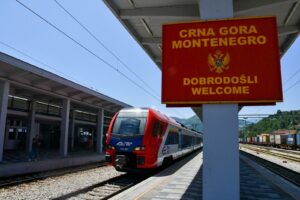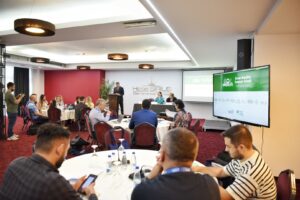28-29.01.2020, Belgrade
Exchange of views on plans and priorities in Western Balkans
Participants (World Bank) : Simon David Ellis, Antonio Nunez, Svetlana Vukanovic
EC/TCT : Alain Baron, Liljana Cela, Nerejda Hoxha, Mate Gjorgjevski, Dejan Lasica
Main conclusions:
- The regular meetings and sharing of information between the Transport Community Permanent Secretariat (TCPS) and World Bank are very important to improve priority planning at regional level and for maximizing the technical assistance (TA) in the transport sector to the region;
- Speaking to the Regional Partners with one single voice- with regards to policy reforms and project priorities, will ensure credibility of our respective actions.
- The Bank pointed out the lack of administrative capacities to implement serious reforms, alongside with the staff overburden and inefficient state-owned enterprises which monopolize (i) transport operations (ii) project design;
- The Bank also pointed out that the current transport infrastructure priority projects in the region may not correspond to the longer term needs of the SEE parties.
- The attached document shows a potential very sharp change in terms of population in the next 20 to 30 years which might require revising the transport infrastructure priorities to take into account this evolution (bigger cities but less populated countries – desertification of large areas).
- The World Bank and TCT also agree that projects in the region need to be:
- “greener” (to include elements in the project planning that take into account the goals for decarbonization, clean energy and environment protection);
- “smarter”- investments should aim at sustainable and innovative solutions providing better quality services;
- adjusted to the real needs of the countries, and not only driven by political considerations (the World Bank questioned in particular the massive program of highways or high speed lines which does not correspond to the medium-long terms need of the countries);
- As a potential deliverable for Zagreb, it was proposed that the World Bank could be leading a review of the current planning and investment schemes, in order to define a list of projects corresponding to the above mentioned needs and with an emphasis on multimodal solutions.
- The list of project deriving from this exercise should also consider the financial capacity of each WB partners to address these priorities.
- This list should then be the reference one for the partners in the region and the key IFIs financing these priorities.
- Regarding the TA offered to the regional partners, it was agreed that better coordination should be set in place to avoid overlapping with TA offered through EU instrument and the future TA contribution of the TCT.
- The following areas of potential cooperation have been identified :
- In the road sector (ITS) – while the Bank has already in place some support actions (in SRB and MK) it was agreed that a the regional action plan encompassing technical standards will have to be carried out first.
- the World Bank will keep the Permanent Secretariat informed and involved where possible when addressing “Maintenance and Asset management” and “Service Level Agreements” currently discussed with Serbia.
iii. the World Bank will be systematically invited to attend Technical Committees/Social Forum.
Rail sector
- Level-crossings, since the World Bank has started a project very similar to the one proposed the Permanent Secretariat to improve safety at level crossings, the Bank will assess the possibility to extend the project (covering only Serbia) to the entire region. Funding needs (potential support from TCT or DG NEAR) will have to be assessed.
Road safety
- During the meeting, the question of the financing by the Bank of the elimination of road safety ‘black spots’ on the most dangerous sections of the extended Trans-European road network to the Western Balkans, was addressed. The design studies are currently being carried out by CONNECTA, but the Bank’s will to support such small scale actions is not proven. This point is critical as the program to cover black spots and Border Crossing improvements was agreed in Poznan last year. As WBIF will only cover 40% of the cost, without the contribution of a financer, the design studies will not be followed by the implementation.
- The TCT and the World agreed to work jointly to support the Regional Participants in updating their Road Safety strategies for 2021-2030 and carrying out Capacity review;
III. The TCT and the World Bank agreed to work jointly to propose a suitable model for establishing a tool for monitoring the road safety performance of Western Balkan partners (this road safety observatory will be under TCT’s supervision).
Transport facilitation
- Regarding the construction and equipment of joint border-crossing points ALB-MK and MK-BG (included in Poznan’s follow up priorities), the World Bank will double check whether they could finance both the design and construction works;
- On eQMS (a priority action identified by TCT) the World Bank will investigate the possibilities to invest in installing the system, following the design studies and modalities for implementation carried out by CONNECTA.
III. Monitoring mechanisms (border-crossing times, travel reliability, etc.) on the network: could be considered by TCT for an extension to the entire network, on the basis of the previous World Bank study on Corridor Vc (funding will be needed).
- The Bank and TCT secretariat agreed to further explore the possibilities of using the competences of the Bank (for dedicated studies), through the participation of the financial TCT under the World Bank’s External Fund for Operations (EFO).
Alain Baron (&TCT team)










